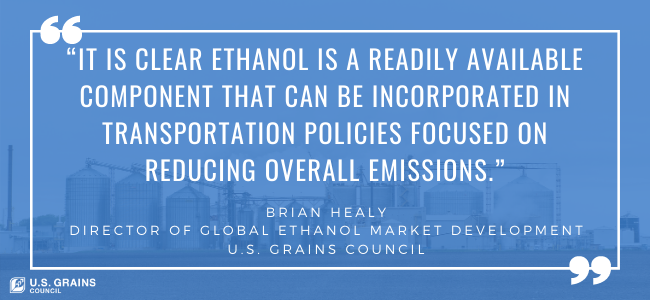As the ongoing impacts of COVID-19 push air quality and climate issues to center stage, the U.S. Grains Council is continuing its work to demonstrate the environmental benefits of ethanol to global stakeholders.
Five years after the Paris Agreement to reduce carbon emissions was first signed, countries are reporting their progress in meeting their nationally determined contributions (NDCs) to overall reductions, including some that have created or implemented domestic ethanol policies to help meet these goals. These include Canada and Brazil with the Clean Fuel Standard and RenovaBio, respectively.
“The International Energy Agency (IEA) recognizes the important role of policies as a demand driver and the ability for countries to achieve their environmental and climate goals,” said Brian Healy, USGC director of global ethanol market development. “Continued attention on the Paris Agreement’s commitment requirements is one factor that furthers the opportunity for ethanol to be recognized as a solution to greenhouse gas emission (GHG) reductions.”
To foster growing use of ethanol around the world, the Council has focused on developing partnerships with local governments and industries; promoting trade policy that recognizes ethanol’s role as a transportation fuel; and ensuring tariff lines and non-tariff trade policies treat ethanol equitably.
“It is clear ethanol is a readily available component that can be incorporated in transportation policies focused on reducing overall emissions,” Healy said. “We are working with our partners to elevate that narrative around GHG emissions savings potential as countries evaluate and present progress on their NDCs.”
Fuel ethanol trade is expected to be down in 2020 from the nearly 2.5 billion gallons of total trade in 2019. Stay-at-home orders have weighed heavily on overall fuel demand, which impacted U.S. ethanol exports by 12 percent in the last marketing year. That short-term market loss serves as a critical reminder of the importance of strong trade policy to incentivize the use of biofuels and ensure they get fair treatment in the global market.
“Our work continues globally, highlighting the ongoing role that policies have for expanded ethanol use,” Healy said. “This is especially prudent considering delays in implementation that have occurred in some Asian markets with currently low blend rates, which are trying to abate their own emissions across the transport sector.”
Find out more about the Council’s ethanol market development efforts.
About The U.S. Grains Council
The U.S. Grains Council develops export markets for U.S. barley, corn, sorghum and related products including distiller’s dried grains with solubles (DDGS) and ethanol. With full-time presence in 28 locations, the Council operates programs in more than 50 countries and the European Union. The Council believes exports are vital to global economic development and to U.S. agriculture’s profitability. Detailed information about the Council and its programs is online at www.grains.org.

